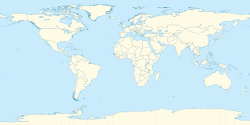Geographical centre of Earth
The geographical centre of Earth is the geometric centre of all land surfaces on Earth. Geometrically defined it is the centroid of all land surfaces within the two dimensions of the Geoid surface which approximates the Earth's outer shape. The term centre of minimum distance[1] specifies the concept more precisely as the domain is the sphere surface without boundary and not the three-dimensional body.
Explained in a different way, it is the location on the surface of Earth where the sum of distances to all locations on land is the smallest. Assuming an airplane with infinite energy and resources, if one were to fly from one start location to any location on land and back again, and repeat this from the same start location to all possible destinations, the starting location where the total travel distance is the smallest would be the geographical centre of Earth.
Its distance definition follows the shortest path on the surface of Earth along the great circle (orthodrome).
History of the concept
[edit]Around the world throughout history many real and illusive places were identified as axis mundi or centers of the world.
In 1864, Charles Piazzi Smyth, Astronomer Royal for Scotland, gave in his book Our Inheritance in the Great Pyramid the coordinates with 30°00′N 31°00′E / 30.000°N 31.000°E, the location of the Great Pyramid of Giza in Egypt.[2][3] He stated that this had been calculated by "carefully summing up all the dry land habitable by man all the wide world over".[2]
See also
[edit]- Centre of the universe (disambiguation)
- Center of population
- Center of the World
- History of the centre of the Universe
- Land and water hemispheres
- Omphalos of Delphi (Ancient Greeks' navel of the Earth)
- Prime meridian – Line of longitude, at which longitude is defined to be 0°
References
[edit]- ^ "Geo mid point: Calculation Methods". 2022. Archived from the original on 9 February 2023. Retrieved 16 September 2022.
- ^ a b c Smyth, Charles Piazzi (1864). Our inheritance in the Great Pyramid. London: W. Isbister & Co. pp. V, 55, 460.
- ^ Wilson, Colin; Rand Flem-Ath (2002). The Atlantis Blueprint: Unlocking The Ancient Mysteries Of A Long-Lost Civilization. Random House Digital, Inc. pp. 63–64. ISBN 9780307481757. Retrieved 4 May 2012.


 French
French Deutsch
Deutsch
